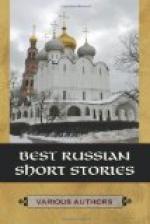“Come quick, dear Grandpapa,” continued Vanka, “I beseech you for Christ’s sake take me from here. Have pity on a poor orphan, for here they beat me, and I am frightfully hungry, and so sad that I can’t tell you, I cry all the time. The other day the master hit me on the head with a last; I fell to the ground, and only just returned to life. My life is a misfortune, worse than any dog’s... I send greetings to Aliona, to one-eyed Tegor, and the coachman, and don’t let any one have my mouth-organ. I remain, your grandson, Ivan Zhukov, dear Grandpapa, do come.”
Vanka folded his sheet of paper in four, and put it into an envelope purchased the night before for a kopek. He thought a little, dipped the pen into the ink, and wrote the address:
“The village, to my grandfather.” He then scratched his head, thought again, and added: “Konstantin Makarych.” Pleased at not having been interfered with in his writing, he put on his cap, and, without putting on his sheep-skin coat, ran out in his shirt-sleeves into the street.
The shopman at the poulterer’s, from whom he had inquired the night before, had told him that letters were to be put into post-boxes, and from there they were conveyed over the whole earth in mail troikas by drunken post-boys and to the sound of bells. Vanka ran to the first post-box and slipped his precious letter into the slit.
An hour afterwards, lulled by hope, he was sleeping soundly. In his dreams he saw a stove, by the stove his grandfather sitting with his legs dangling down, barefooted, and reading a letter to the cooks, and Viun walking round the stove wagging his tail.
HIDE AND SEEK
BY FIODOR SOLOGUB
Everything in Lelechka’s nursery was bright, pretty, and cheerful. Lelechka’s sweet voice charmed her mother. Lelechka was a delightful child. There was no other such child, there never had been, and there never would be. Lelechka’s mother, Serafima Aleksandrovna, was sure of that. Lelechka’s eyes were dark and large, her cheeks were rosy, her lips were made for kisses and for laughter. But it was not these charms in Lelechka that gave her mother the keenest joy. Lelechka was her mother’s only child. That was why every movement of Lelechka’s bewitched her mother. It was great bliss to hold Lelechka on her knees and to fondle her; to feel the little girl in her arms—a thing as lively and as bright as a little bird.
To tell the truth, Serafima Aleksandrovna felt happy only in the nursery. She felt cold with her husband.
Perhaps it was because he himself loved the cold—he loved to drink cold water, and to breathe cold air. He was always fresh and cool, with a frigid smile, and wherever he passed cold currents seemed to move in the air.
The Nesletyevs, Sergey Modestovich and Serafima Aleksandrovna, had married without love or calculation, because it was the accepted thing. He was a young man of thirty-five, she a young woman of twenty-five; both were of the same circle and well brought up; he was expected to take a wife, and the time had come for her to take a husband.




